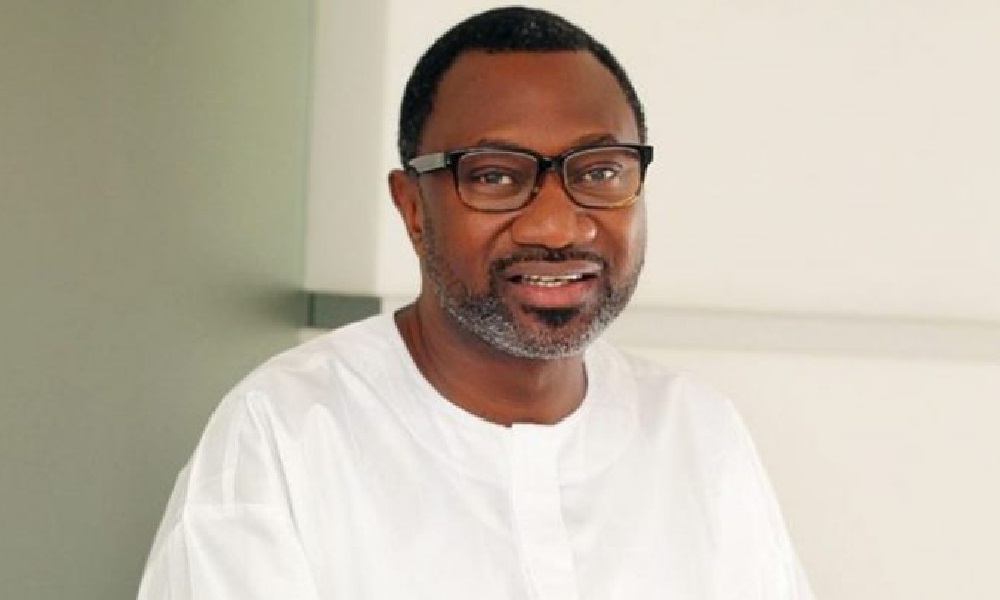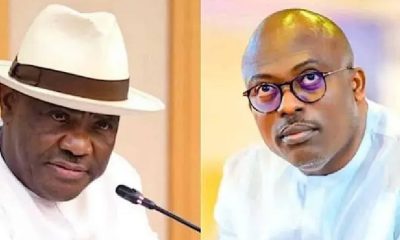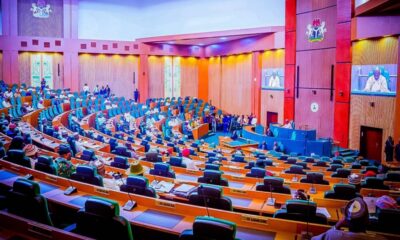Economy
First Bank Appoints 5 New Directors As Otedola Takes Over

With billionaire Femi Otedola in the saddle as its new Chairman, First Bank of Nigeria Holdings Plc, on Wednesday, appointed two new non-executive directors for the holding company and three new non-executive directors for the First Bank.
Updating the Nigerian Exchange Group of recent development within the bank, the company’s Secretary, Adewale Arogundade, announced the appointment of Olusola Adeeyo and Viswanathan Shankar as non-executive director and independent non-executive director respectively in FBN Holdings.
The company also announced Remilekan Odunlami as non-executive director for First Bank while Anil Dua and Fatima Ali were appointed as independent non-executive directors.
The appointments of the five new directors are subject to the approval of the Central Bank of Nigeria (CBN).
Adeeyo, a former banker and ex-Chairman of AXA Mansard Insurance Plc, is currently the Chairman of Astral Waters Limited, a water bottling and delivery company.
Shankar, the Chief Executive Officer of private equity investments firm Gateway Partners, previously served as the CEO of Standard Chartered Plc.
Odunlami has served as Director at CitiBank Nigeria Limited and FirstBank. She currently sits on the Board of Access Pensions Limited as an Independent Non-Executive Director and the Board of Rand Merchant Bnak Limited as a Non-Executive Director.
Also, Dua has sat on the Board of Dangote GSP Offshore FZE, Seychelles International Mercantile Banking Corporation, Heirs Holdings Oil and Gas Limited, Matador Investment Management Limited and Africa Property Development Managers Limited.
Ali, founder of Santi Food and Beverage Limited, currently sits on the Board of Reconnect Health Development Initiative International, a mental health charity organisation.
Late January, First Bank of Nigeria Holdings Plc appointed Otedola, the 20th richest man in Africa as its new Chairman.
With his appointment, Otedola, also the Chairman of Geregu Power, succeeded Ahmad Abdullahi.
Otedola was recently ranked by American business magazine, Forbes, as the 20th richest African with a fortune of $1.1bn.
Otedola was first appointed to the Board of FBN Holdings Plc on August 15, 2023 as a Non-Executive Director, the company said.
Economy
75.5% of rural Nigerians now live below poverty line — World Bank

The World Bank has disclosed that a staggering 75.5 per cent of rural Nigerians are now living below the poverty line, reflecting deepening hardship in the country’s hinterlands.
This was revealed in the Bank’s April 2025 Poverty and Equity Brief for Nigeria, which paints a grim picture of worsening economic hardship, widening inequality, and persistent underdevelopment across much of the nation.
While poverty is widespread among urban populations, the report emphasised that the situation is significantly worse in rural areas, where economic stagnation, high inflation, and insecurity have exacerbated living conditions.
“Based on the most recent official household survey data from Nigeria’s National Bureau of Statistics, 30.9 per cent of Nigerians lived below the international extreme poverty line of $2.15 per person per day in 2018/19 before the COVID-19 pandemic,” the report stated.
The report also highlighted Nigeria’s enduring regional disparities. “Nigeria remains spatially unequal. The poverty rate in northern geopolitical zones was 46.5 per cent in 2018/19, compared with 13.5 per cent for southern ones. Inequality measured by the Gini index was estimated at 35.1 in 2018/19.
“Nigeria’s Prosperity Gap — the average factor by which individuals’ incomes must be multiplied to attain a prosperity standard of $25 per day for all — is estimated at 10.2, higher than most peers.”
Despite successive policy interventions, these figures underscore a persistent economic divide across the country.
The report’s demographic analysis found that children aged 0 to 14 years had a poverty rate of 72.5 per cent, reflecting the scale of deprivation among the youngest segment of the population.
Gender disparities were also observed, with 63.9 per cent of females and 63.1 per cent of males classified as poor under the $3.65 per day lower-middle-income threshold.
Education emerged as a significant determinant of poverty, with Nigerians lacking formal education experiencing a poverty rate of 79.5 per cent. This contrasts with 61.9 per cent for those with primary education and 50.0 per cent for secondary school graduates. Only 25.4 per cent of those with tertiary education were considered poor.
The report also drew attention to multidimensional poverty indicators, which further reflect widespread deprivation.
According to the World Bank, about 30.9 per cent of Nigerians live on less than $2.15 daily, 32.6 per cent lack access to limited-standard drinking water, 45.1 per cent do not have limited-standard sanitation, and 39.4 per cent have no electricity.
Education access remains a challenge, with 17.6 per cent of adults yet to complete primary education, and 9.0 per cent of households reporting at least one school-aged child not enrolled in school.
The report noted that even before the COVID-19 pandemic, efforts to reduce extreme poverty had largely stalled.
“Before COVID-19, extreme poverty reduction had almost stagnated, dropping by only half a percentage point annually since 2010. Living standards of the urban poor are hardly improving, and jobs that would allow households to escape poverty are lacking,” the report read.
Although the World Bank acknowledged recent economic reforms aimed at stabilising Nigeria’s macroeconomic outlook, it warned that persistently high inflation continues to undermine household purchasing power, particularly in urban areas where incomes have not kept pace with rising costs.
In light of the worsening situation, the Bank called for urgent policy action to shield vulnerable groups from inflationary shocks and to drive job creation through more productive economic activities.
Economy
Naira Records Marginal Decline Against Dollar at Official Market

The Nigerian naira experienced a mild drop in value on Friday, closing at ₦1,602.18 per dollar in the official foreign exchange market, based on figures released by the Central Bank of Nigeria (CBN).
This marks a decrease of ₦5.49 from the rate of ₦1,596.69 recorded on April 30, the last trading day before the May 1 Workers’ Day holiday—indicating a depreciation of approximately 0.34%.
Earlier in the week, from Monday to Wednesday, the naira remained relatively stable, exchanging at ₦1,599.95, ₦1,599.71, and ₦1,596.69 respectively.
Although the local currency showed some consistency mid-week, it wrapped up the week with a loss, following a sligh dip of 0.02% at the beginning of the week
Economy
Black Market Dollar hits N1,610 Amid Economic quagmire

What is the Dollar to Naira Exchange Rate in the Black Market (Also Known as the Parallel Market or Aboki FX)?
Below is the black market exchange rate for the U.S. dollar to the Nigerian naira as of Thursday, May 1, 2025. These are the typical rates at which you can exchange dollars for naira:
Dollar to Naira Black Market Exchange Rate (May 1, 2025):
At the Lagos Parallel Market, also referred to as the black market, Bureau De Change (BDC) operators are buying dollars at ₦1,602 and selling at ₦1,610, according to market sources.
Please note: The Central Bank of Nigeria (CBN) does not recognize or endorse transactions conducted on the parallel market. The CBN advises individuals and businesses seeking foreign exchange to use official banking channels.
-

 Opinion15 hours ago
Opinion15 hours agoRIVERS, WIKE, FUBARA, AND THE WAY FORWARD
-

 Politics14 hours ago
Politics14 hours agoJust in: Delta PDP Reps members defect to APC
-

 News19 hours ago
News19 hours agoVDM may be released on Tuesday
-

 News13 hours ago
News13 hours agoTension As Lawmakers Warns of Public Revolt Over Insecurity
-

 News16 hours ago
News16 hours agoCourt bans Nnamdi Kanu’s in-law from 3 proceedings over live streaming
-

 News16 hours ago
News16 hours agoNANS Barricades Lagos-Ibadan Expressway Over Alleged NELFUND Mismanagement
-

 News11 hours ago
News11 hours agoEdo Speaker, Two Other Lawmakers, Formally Join APC
-

 News23 hours ago
News23 hours agoNASS Expected To Tackle Security Challenges Upon Resumption—-Nnamchi





